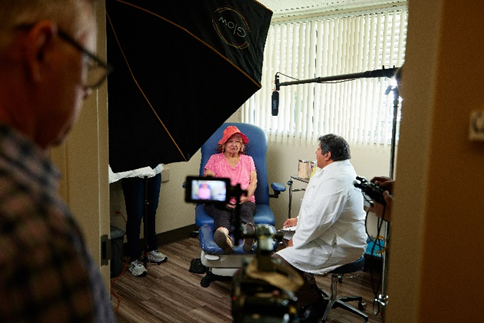The Indian Health Service Alzheimer's Program team is training health care and community staff to screen for early signs of dementia. They have started pilot programs with other IHS programs as part of this initiative. The team has developed videos using the Mini-Cog, an evidence-based, three-minute screening tool designed to detect early signs of cognitive impairment.
Discussing memory and thinking issues as a routine part of clinical practice is important, with recent IHS research confirming that these conversations with patients need to start earlier.
An IHS study found that 14 percent of American Indian and Alaska Native people (ages 45-64) receiving care at IHS, tribal, or urban Indian health care facilities had early-onset dementia. Another study funded by the National Institute of Health this year found that the rates of cognitive impairment among American Indian and Alaska Native people are as high or higher than other minority populations. This data and the stories we hear daily from communities and families impacted by dementia are what motivates the IHS Alzheimer's Program team.
In 2023, our team began collaborating with the Community Health Representative Program to improve cognitive health screenings in community settings. We launched a six-month pilot where CHR programs from the Albuquerque, California, Great Plains, Oklahoma City, Phoenix, and Portland Areas tested using the Mini-Cog in community settings. Six volunteer sites participated, conducting 193 screenings and identifying 34 positive screenings (17.6 percent). Led by Michelle Archuleta, IHS Division of Clinical and Community Services CHR consultant, the pilot also created learning materials, electronic coding, and workflow job aids. This project was based on the successful Mini-Cog screening pilot conducted by the Division of Oral Health.

A patient participates in a demonstration of the Mini-Cog screening with her doctor at the Indian Health Council, Inc. in California.
To raise awareness and encourage more screenings, IHS’ Alzheimer's Program filmed a series of educational videos earlier this year. We appreciate the staff and patients from Indian Health Council Inc. in California, one of the Alzheimer's Program grantees, who allowed us to utilize their sites, staff, and patients to create the videos. The videos focus on the importance of dementia screening for American Indian and Alaska Native people and offer two quick how-to demos.
The Mini-Cog screening requires no special medical knowledge or training to learn. It can assist health care and community health providers in identifying possible cognitive impairment in older patients at an earlier stage of their life. The Mini-Cog tool:
- Can be accessed freely and publicly.
- Helps to determine when more in-depth cognitive evaluation is needed.
- Allows easy screening during regular wellness exams, primary care visits, other health care settings, and anywhere older adults go to find needed services, such as senior centers and community organizations.
It can be hard for elders to be open and honest about their health care needs. We hope that with videos and tools that include tribal and urban Indian staff and people, staff will learn how to screen for dementia and related cognitive issues early and feel more confident doing it. Early detection empowers all of us to provide better care planning and helps families make more informed decisions.
To view the videos, information about the Mini-Cog, or other resources, visit the IHS Alzheimer's Program website.
During World Alzheimer’s Month in September, the IHS recently announced the award of nearly $1.2 million through six cooperative agreements to enhance tribal and urban Indian health system local capacity to provide dementia care and services. These awards will advance the U.S. Department of Health and Human Services’ work to fulfill the National Plan to Address Alzheimer’s Disease by enhancing care quality and efficiency, expanding support for people with Alzheimer’s disease and related dementias and their families, and enhancing public awareness and engagement.



